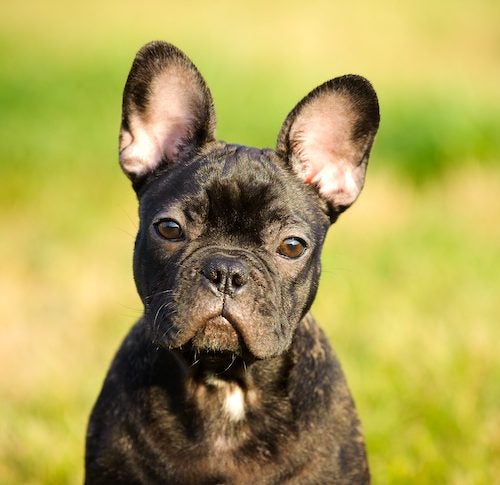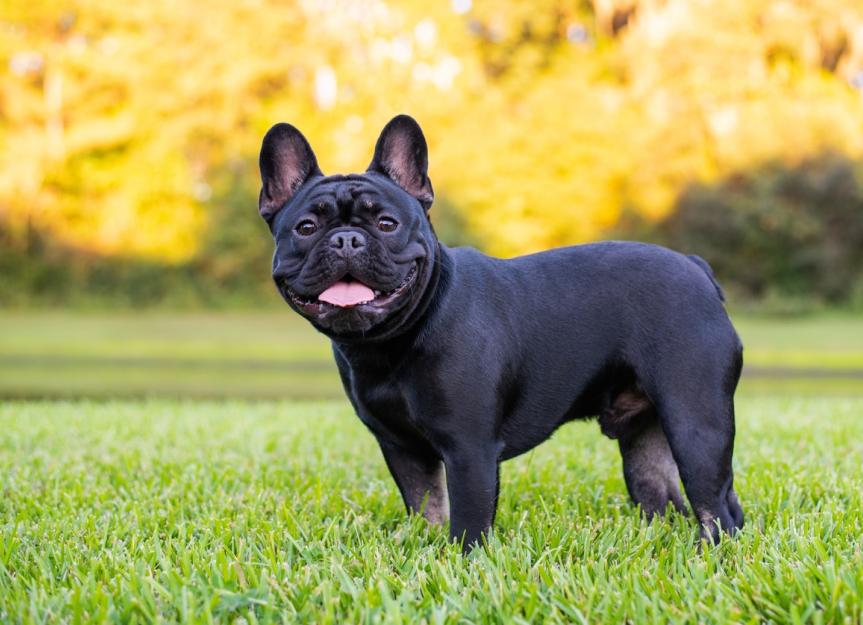When it comes to socializing with other dogs, French Bulldogs may surprise you. Despite their compact size and sometimes bossy demeanor, French Bulldogs generally get along well with other dogs. They have a friendly and sociable nature, which makes them good companions for canine friends. Unlike some breeds that can be aggressive or territorial, French Bulldogs tend to be tolerant and accepting, making them a great choice for multi-dog households.
French Bulldogs have a rich history rooted in France. Originally bred as companion dogs for lace workers, they were later favored by French royalty. This history of companionship and affection means that French Bulldogs have an inherent desire to be around others, including other dogs. In fact, studies have shown that dogs who are well socialized with other dogs tend to have better overall behavior and adaptability. So, if you’re considering adding a French Bulldog to your household, rest assured that they have a good track record of getting along with other dogs.
French Bulldogs generally get along well with other dogs. They have a friendly and sociable nature, making them good companions for other canine friends. However, it’s important to introduce them slowly and supervise their interactions to ensure compatibility. Early socialization and proper training are key factors in fostering positive relationships between French Bulldogs and other dogs. Overall, French Bulldogs can be a great addition to a multi-dog household.

Are French Bulldogs Good with Dogs?
French Bulldogs are known for their adorable appearance and friendly nature. But if you’re considering adding a French Bulldog to your household, you might be wondering if they get along well with other dogs. In this article, we will explore whether French Bulldogs are good with dogs and provide you with detailed information about their behavior and compatibility with other four-legged friends.
French Bulldogs’ Temperament with Other Dogs
French Bulldogs generally have a friendly and sociable temperament, making them good companions for other dogs. However, it’s essential to consider their individual personalities and socialization experiences. Some French Bulldogs may be more outgoing and eager to play with other dogs, while others may be more reserved and prefer human company.
Early socialization plays a crucial role in determining how well a French Bulldog will interact with other dogs. By exposing them to various environments, people, and animals from a young age, you can help them develop positive associations and appropriate social skills. This can greatly enhance their ability to get along with other dogs throughout their lives.
It’s important to note that French Bulldogs belong to the Brachycephalic breed, which means they have a flattened face and a shorter snout. This characteristic can sometimes make it challenging for them to regulate body temperature, particularly during hot weather or intense exercise. It’s crucial to monitor their interactions with other dogs to ensure they don’t overexert themselves and to avoid situations that could cause them stress or overheating.
Introducing French Bulldogs to Other Dogs
When introducing a French Bulldog to another dog, it’s essential to do so in a controlled and gradual manner. Here are some steps you can follow to ensure a successful introduction:
- Choose a neutral territory: Pick a location where neither dog feels territorial or defensive, such as a neutral park or a friend’s backyard.
- Keep both dogs on a leash: This allows you to have control over the situation and intervene if necessary.
- Allow them to sniff: Let the dogs approach each other and sniff to establish familiarity.
- Observe their body language: Pay attention to their body language. Look for signs of relaxation, wagging tails, and loose movements, indicating that they are comfortable with each other.
- Supervise interactions: Continue to monitor their interactions closely, and be ready to step in if any signs of aggression or discomfort arise.
- Provide positive reinforcement: Reward both dogs with treats and praise for calm and friendly behavior towards each other.
Remember that each dog is unique, and the introduction process may vary depending on their personalities and past experiences. Consulting with a professional dog trainer or behaviorist can provide valuable guidance and support.
Tips for Ensuring Positive Interactions
To promote positive interactions between your French Bulldog and other dogs, consider the following tips:
- Continued socialization: Regularly expose your French Bulldog to different dogs, people, and environments to maintain their social skills and prevent them from becoming too attached to one dog.
- Training and obedience: Teach your French Bulldog basic commands, such as “sit,” “stay,” and “come.” This will help you have control over their behavior in social situations and ensure their safety.
- Positive reinforcement: Reward your French Bulldog for calm and friendly behavior towards other dogs. Use treats, praise, and play as positive reinforcement tools.
- Supervision: Always monitor your French Bulldog’s interactions with other dogs, especially during playtime. Intervene if play becomes too rough or if one dog shows signs of discomfort.
- Separation when necessary: If your French Bulldog is not getting along with a particular dog or if aggression becomes an issue, separate them and consult a professional for guidance.
Considerations for Brachycephalic Breeds
As mentioned earlier, French Bulldogs are a brachycephalic breed, which means they have certain considerations due to their unique anatomy. When interacting with other dogs, it’s important to be mindful of the following:
- Avoid strenuous exercise: Brachycephalic breeds can have difficulty breathing properly during intense exercise or hot weather. Ensure they have access to shade, water, and rest when needed.
- Monitor for signs of overheating: Watch for signs of distress, such as excessive panting, drooling, or collapsing. If your French Bulldog shows signs of overheating, immediately provide a cool, quiet environment and contact a veterinarian if necessary.
- Avoid situations that cause stress: Stress and anxiety can exacerbate breathing difficulties in brachycephalic breeds. Avoid situations that may cause your French Bulldog to become anxious, such as crowded or noisy environments.
By being aware of these considerations and taking appropriate precautions, you can help ensure the well-being of your French Bulldog during interactions with other dogs.
Are French Bulldogs Good with Dogs? – Conclusion
In summary, French Bulldogs can be good with dogs if they are properly socialized from a young age and introduced to other dogs in a controlled manner. Their friendly and sociable nature, combined with positive reinforcement training, can contribute to harmonious interactions with other canines.
However, it’s important to consider their brachycephalic anatomy and take precautions to ensure their comfort and safety during play and exercise. By being mindful of their unique needs and providing appropriate supervision, your French Bulldog can thrive in the company of other dogs.
Key Takeaways: Are French Bulldogs Good with Dogs?
1. French Bulldogs can get along well with other dogs if properly socialized.
2. They have a friendly and playful nature, which helps them form positive relationships with other dogs.
3. However, some French Bulldogs may exhibit dominant behavior towards other dogs.
4. Early socialization and training are essential to ensure good behavior and compatibility with other dogs.
5. It is important to introduce French Bulldogs to different dogs and situations from a young age to promote positive interactions.
Frequently Asked Questions
In this section, we will address some frequently asked questions about whether French Bulldogs are good with other dogs. If you’re considering getting a French Bulldog and already have other dogs, it’s important to understand their temperament and compatibility. Read on to find out more.
1. What is the temperament of French Bulldogs towards other dogs?
French Bulldogs are generally friendly and sociable towards other dogs. They have a playful and amiable nature, which makes them good companions for other dogs. However, it’s important to note that individual temperament can vary, and some French Bulldogs may not get along well with certain breeds or personalities. Early socialization and proper introductions are key for ensuring positive interactions between French Bulldogs and other dogs.
If you already have other dogs at home, it’s recommended to gradually introduce them to your French Bulldog in a controlled environment. Supervision is important during the initial stages of their interactions to ensure everyone feels comfortable and safe. With proper socialization and training, French Bulldogs can form strong bonds with other dogs and enjoy their company.
2. Are French Bulldogs prone to aggression towards other dogs?
While French Bulldogs are generally not known for aggressive behavior towards other dogs, there are certain factors that can influence their temperament. Like any dog breed, individual personalities and past experiences play a role in determining their behavior. French Bulldogs may become aggressive or defensive if they feel threatened or provoked.
It’s important for owners to be aware of their French Bulldog’s body language and monitor their interactions with other dogs. If you notice signs of aggression, such as growling, snarling, or snapping, it’s essential to address the issue with professional training and behavior modification techniques. With proper training and socialization, most French Bulldogs can develop positive and friendly relationships with other dogs.
3. Can French Bulldogs live harmoniously with other dogs in the same household?
French Bulldogs generally do well in multi-dog households. They are known for their friendly and adaptable nature, which makes it easier for them to coexist with other dogs. However, as with any breed, it’s important to introduce new dogs gradually and provide them with their own space and resources.
Each dog should have their own food and water bowls, bedding, and toys to avoid potential conflicts over resources. Additionally, proper supervision is key, especially during the initial stages of introducing a new dog to the household. With the right approach, French Bulldogs can live harmoniously with other dogs and form strong bonds.
4. How can I socialize my French Bulldog with other dogs?
Socializing your French Bulldog with other dogs is crucial in ensuring they have positive and well-rounded interactions. Here are some tips for effective socialization:
1. Start early: Begin socialization when your French Bulldog is still a puppy. Expose them to different dogs, environments, and situations to build their confidence and familiarity.
2. Enroll in puppy classes: Joining puppy classes can provide structured socialization opportunities for your French Bulldog. These classes often involve controlled interactions with other puppies, supervised by professional trainers.
3. Arrange playdates: Set up playdates with well-behaved and friendly dogs that you trust. Ensure the play environment is safe and supervised to avoid any negative experiences.
4. Positive reinforcement: Reward your French Bulldog for calm and friendly behavior during interactions with other dogs. Use treats or praise to reinforce positive social behavior.
5. Can French Bulldogs be aggressive towards smaller breeds?
French Bulldogs are generally gentle and tolerant towards smaller breeds. Their playful nature often makes them good companions for dogs of all sizes. However, it’s important to monitor their interactions and ensure the smaller breed feels comfortable and safe.
If you have a French Bulldog and a smaller breed, make sure to provide both dogs with separate spaces and resources to prevent any potential conflicts over territory or belongings. Supervision and proper introductions are essential to ensure a harmonious relationship between a French Bulldog and a smaller breed.

French Bulldog: The Pros and Cons of Owning One
French Bulldogs generally get along well with other dogs.
They are social and friendly, but may not tolerate high-energy or dominant dogs.
